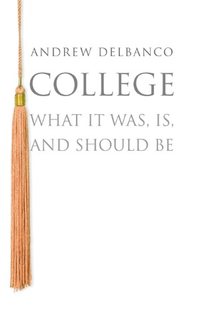

Purchase
What It Was, Is, and Should Be
Princeton University Press
March 2012
On Sale: March 20, 2012
229 pages
ISBN: 0691130736
EAN: 9780691130736
Kindle: B007BOBIRC
Hardcover / e-Book
Add to Wish List
Non-Fiction
As the commercialization of American higher education
accelerates, more and more students are coming to college
with the narrow aim of obtaining a preprofessional
credential. The traditional four-year college experience--an
exploratory time for students to discover their passions and
test ideas and values with the help of teachers and
peers--is in danger of becoming a thing of the past.
In College, prominent cultural critic Andrew
Delbanco offers a trenchant defense of such an education,
and warns that it is becoming a privilege reserved for the
relatively rich. In arguing for what a true college
education should be, he demonstrates why making it available
to as many young people as possible remains central to
America's democratic promise. In a brisk and vivid
historical narrative, Delbanco explains how the idea of
college arose in the colonial period from the Puritan idea
of the gathered church, how it struggled to survive in the
nineteenth century in the shadow of the new research
universities, and how, in the twentieth century, it slowly
opened its doors to women, minorities, and students from
low-income families. He describes the unique strengths of
America's colleges in our era of globalization and, while
recognizing the growing centrality of science, technology,
and vocational subjects in the curriculum, he mounts a
vigorous defense of a broadly humanistic education for all.
Acknowledging the serious financial, intellectual, and
ethical challenges that all colleges face today, Delbanco
considers what is at stake in the urgent effort to protect
these venerable institutions for future generations.
Comments
No comments posted.
Registered users may leave comments.
Log in or register now!
| 


 © 2003-2025 off-the-edge.net
all rights reserved Privacy Policy
© 2003-2025 off-the-edge.net
all rights reserved Privacy Policy